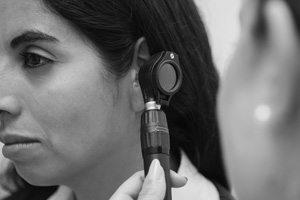View the complete list of conditions
What is an Acoustic Neuroma?
An acoustic neuroma is a slowly-growing benign (non-cancerous) tumor that develops on the vestibular nerve, which connects to the brain directly to the inner ear. Some of the tiny branches of this nerve significantly influence hearing and balance, so pressure from an acoustic neuroma can result in unsteadiness, a ringing sound in the ears (tinnitus) and hearing loss.
In some cases, an acoustic neuroma can grow rapidly and become big enough to create pressure on the brain, interfering with the bodily functions controlled by the section of the brain it affects. When an acoustic neuroma is in its early stages and relatively small, it is treated with regular monitoring. But if it grows to a size that has the potential to cause damage, more active treatments such as radiation or surgical removal may be necessary.
Acoustic Neuroma Symptoms
Many acoustic neuromas do not cause any harm. However, it can take time to detect their presence, especially since they may take years to develop. When symptoms appear, they typically present as hearing loss or balance problems. Tumors that grow to a sufficient size may press against nearby nerves that control muscles in the face or nearby blood vessels and brain structures, causing more prominent symptoms such as ear pain.
In some unusual cases, acoustic neuromas can grow large enough to exert pressure on the brain stem and cause a life-threatening situation. Contact a doctor as soon as possible if you experience hearing loss, a ringing sensation in one ear, unexplained loss of balance or persistent unsteadiness during the execution of ordinary movement and activities. Early detection of an acoustic neuroma is essential in preventing the tumor from reaching a size that can cause significant problems.
Causes of Acoustic Neuroma
The primary cause of acoustic neuromas is when a specific gene on chromosome 22 begins to malfunction. Under normal function, this gene creates a protein that suppresses tumors and the growth of specific cells that cover the nerves in that area. It is not known what causes this gene to malfunction in the first place, which means there is no way to prevent it from happening, at least at present. However, there is at least one known risk factor, so if you fall into the grouping of individuals with this particular risk factor, it would be advisable for you to stay alert for signs of development of an acoustic neuroma.
The most significant confirmed risk factor for developing an acoustic neuroma is genetic, i.e., having one or more parents with the unusual genetic disorder called neurofibromatosis type II (NF2). However, even this genetic predisposition only accounts for about 5% of all occurrences of acoustic neuromas, meaning that most cases cannot be predicted.
One of the primary markers for NF2 is when non-cancerous tumors develop on the nerves responsible for maintaining balance. In addition, NF2 is considered an autosomal dominant disorder, meaning that a single parent can pass on the defective gene. In other words, any child of a parent with NF2 has about a 50% chance of inheriting the disorder.
Treatment for Acoustic Neuromas
Any treatment program for an acoustic neuroma will depend on the patient's general health, age and the size and location of the tumor itself. In some cases, careful monitoring is the only recommended treatment, particularly when the tumor is small and growing slowly. Several more active approaches may be used when the tumor has grown to a size sufficient to warrant intervention.
Surgery for Acoustic Neuroma
Microsurgical removal involves having the tumor extracted through an incision made in the skull while a patient is under general anesthesia. Radiation therapy is sometimes used instead of conventional surgery to shrink the tumor or slow its growth. This approach is often recommended after conventional surgery to eliminate any residual tumor pieces.
Radiation therapy has the advantage of targeting the precise area of the tumor so that no surrounding tissue is damaged in the process. Another option is stereotactic radiosurgery, which calls for radiation to be delivered to the tumor's precise location without making any skull incisions. A local anesthetic is given to the patient before the procedure begins. The tumor is then located via imaging scans. Once the exact position of the tumor is determined, radiation beams are directed at that precise location for a less invasive solution to the problem.
“I Think I Have an Acoustic Neuroma”
New treatments for acoustic neuromas can occur at any time. Dr. Cohen is an ENT (ear, nose and throat) acoustic neuroma specialist physician utilizing the most recent medical information to help patients. If you think you might have an acoustic neuroma or notice any changes to hearing or balance, contact our office right away for an appointment. We will evaluate you, diagnose any acoustic neuromas and other similar conditions and present treatment options and strategies to help you make informed decisions.
Conditions
Ears
Nose
- Ballon Sinusplasty Surgery
- Concha
- Deviated Septum Relief In NYC
- Deviated Septums
- Fixing a Deviated Septum
- Identifying A Deviated Septum
- How Do I Know if My Nose is Broken?
- Nasal Polyps
- Nasal Polyp Surgery
- Nasal Septums
- NYC Nasal Polyp Reduction
- Septoplasty And Turbinate Surgery
- Treating a Deviated Septum
- Treating Nasal Polyps
- Turbinate Reduction
Throat
- Dysphagia
- Leukoplakia Treatments
- Reflux Laryngitis
- Swallowing Disorders
- Treating Anosmia
- Vocal Disorders
Allergies & Asthma
- Dealing With Allergic Rhinitis
- Managing Allergies and Asthma
- How to Allergy-Proof Your Home from Indoor Allergens
Sinus
- Chronic Sinusitis Treatment
- Endoscopic Sinus Surgeries
- Sinus Headache Cure
- Sinus Infection Treatment
- Sinusitis Surgery
- Treating Sinus Infections
Sleep & Snoring
- Diagnosing Sleep Disorders
- Having Trouble Sleeping
- Home Sleep Studies
- Pillar Implants
- Pillar Treatment for Snoring
- Sleep Apnea Conditions
- Sleep Apnea Specialists
- Sleepless in NYC
- Sleep Study Diagnosis
- Can Snoring Cause Health Issues?
- Treating Sleep Apnea
- Treating Snoring
- What is a CPAP Device?





